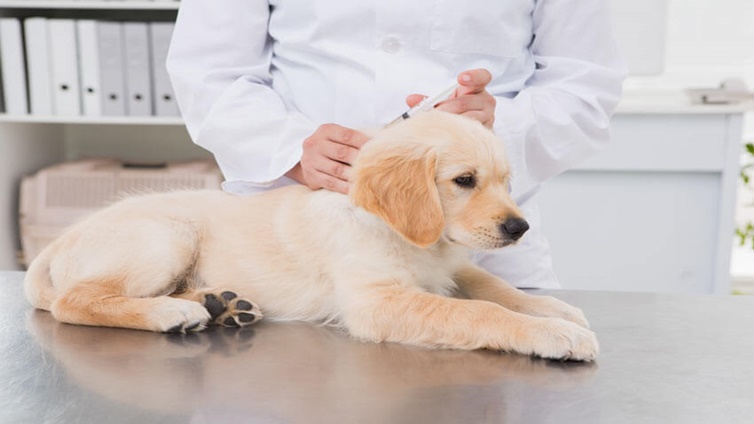The purpose of dog vaccination is to protect the dog from various diseases.
However, just like with human vaccination, side effects are possible and fairly common.
In order to be prepared and know what to expect, read this article and get information both you and your dog will benefit from.
Vaccines prevent many illnesses and enable our dogs to live a long and healthy life. They also prevent diseases from spreading, from dog to dog, as well as dog to human. Some vaccines are so important that they are even required by law, so-called core vaccines.
While there are many benefits when it comes to vaccination, there are certain side effects that all dog owners should be aware of before vaccinating their dog. Most dogs experience some mild side effects, but there are also more serious side effects that shouldn’t be taken lightly.
How Do Vaccines Work?
Vaccines prepare the immune system so that they can protect itself from enemies, i.e. organisms that cause disease. Vaccines have antigens in them that trick the immune system. These antigens look like disease-causing organisms but don’t actually lead to diseases. However, the immune system doesn’t recognize the difference and is stimulated thanks to the vaccine. That way it is prepared in case of real disease, as it can then recognize and fight it.
Which Vaccines Does My Dog Need?
As mentioned, some vaccines are required by law in many states and countries and are considered vital. These vaccines are called core vaccines. As opposed to core vaccines, there are many vaccines that are given depending on the dog, its health, exposure risk, etc. These are called non-core vaccines.
Core vaccines are vaccines for canine parvovirus, distemper, canine hepatitis and rabies. Non-core vaccines include vaccines against Bordetella bronchiseptica, Borrelia burgdorferi, Leptospira bacteria and Lyme disease.
It is also important to remember that all dogs are different and that all factors should be considered when deciding which vaccines your dog should get. Needless to say, not all dogs need all vaccines. Some factors to consider are:
- Age
- Environement
- Medical history
- Lifestyle
It is also important to follow a schedule when it comes to dog vaccination. For more information on check out the dog vaccination schedule chart.
What Side Effects Are Associated With Dog Vaccination?
While there are many benefits to dog vaccinations, you should still be prepared and aware of the possible side effects. Many dogs experience one or more mild side effects after the vaccination. In most cases, they are completely harmless and just the body’s way of reacting to a change. However, if the side effects don’t go away after one or two days or become more severe, it is time to react and take your dog to the vet. Most common side effects include:
- Fever
- Vomiting
- Diarrhea
- Loss of appetite
- Lethargy
- Shaking
- Facial swelling
- Seizure
- Lameness
- Reaction around the injection site, including pain, swelling, redness or hair loss
- Breathing problems
- Collapse
- Coughing
Before you continue reading, check out the video below and learn more about possible side effects:
Dog Vaccination Q&A
We understand how important your dog is to you, so we decided to gather your most common questions when it comes to dog vaccination and answer them below. If you have more questions or thoughts, don’t hesitate to use the comment section!
Question: Should I vaccinate my dog despite the possible side effects?
Answer: The vaccine benefits definitely outweigh the possible side effects. This is especially the case when it comes to core vaccines, as they can save your dog’s life. When it comes to non-core vaccines, you have to consider many factors when deciding. If the exposure risk is high it is important to discuss it with your veterinary, talk about your dog’s medical history and make a decision.
Question: When do side effects appear?
Answer: Side effects usually start appearing a couple of hours after the vaccination, but they can also take days, and even years, to appear.
Question: When should I start getting worried?
Answer: Mild symptoms can be ignored and usually go away quickly. However, if the side effects last for more than one or two days, you should contact your veterinarian and find a solution.
Question: How do I recognize an allergic reaction?
Answer: If you notice an allergic reaction after the vaccination, it is vital that you go to the vet immediately. These reactions can even occur minutes after vaccination, which is why it could be a good idea to stay at the vet’s for some time after the vaccination. Common symptoms to look out for are vomiting and diarrhea that don’t stop, itchy and bumpy skin, swelling around the face, problems with coughing and breathing and collapse.
Question: What precautionary measures can I take?
Answer: Considering you’re reading this, you’re already on the right track. Informing yourself before the vaccination is very important in order to know what to expect and how you should go about it. The next thing you can do is to choose a suitable time for you, which means maybe on a day off or the weekend so that you can observe your dog and react in case of side effects. Last but not least, be there for your dog during and after the vaccination as much as possible. Cuddle, play and just be present – your dog will appreciate it.
Conclusion
As with any medication, side effects are possible and fairly common. They can appear minutes, hours, days and, in some extreme cases, years after the vaccination. They can range from mild to severe side effects, including allergic reactions.
Most common side effects include fever, diarrhea, vomiting, facial swelling, lethargy, respiration problems and reactions around the vaccination site. Luckily, most symptoms go away after a couple of hours or a day. However, if you notice a severe allergic reaction or if the symptoms don’t go away, you should take your dog to the vet immediately. It is also a good idea to stay at the vet’s for some time after the vaccination, just in case.
We know how much you care about your dog and that his/her health comes first. Even though it may seem scary to read about possible side effects, vaccines do save lives and outweigh by far potential problems. Stay informed and be there for your dog and everything will be great!





















